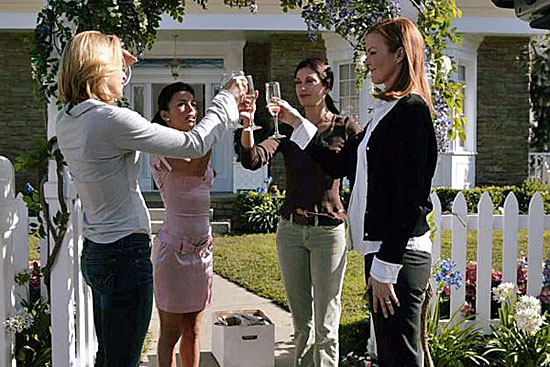Pushing jobs, not condos, at Universal
March 1, 2012

Parts of Universal's backlot, including "Wisteria Lane," above, would be moved under home plan. Photo: AP/ABC
NBC/Universal should drop plans to build nearly 3,000 housing units on its backlot, Supervisor Zev Yaroslavsky said this week in a strongly-worded letter to studio chief Ron Meyer.
While Yaroslavsky has previously criticized the scale of the Evolution Plan, this is the first time he has pushed the studio to drop the housing component altogether. Doing so, he said, would better position Universal for a future in which it remains a strong entertainment industry contributor to the L.A. economy.
“Abandoning that portion of your plan would make long-term economic sense for this region by ensuring that Universal will remain a full-service motion picture and television production campus and a major contributor to our regional economy,” Yaroslavsky said in his letter.
Building some 2,900 condos, lofts, townhouses and apartments on 124 acres of Universal’s property would cut into the studio’s backlot and require relocation of its famed “Psycho” house. It also would mean uprooting Wisteria Lane, the setting for “Desperate Housewives,” now in its final season, and Falls Lake, where movies including “Jaws” were shot.
Even without the housing element, the 20-year Evolution Plan remains a large-scale blueprint for how the studio proposes to grow on its 391-acre Universal City site.
The Entertainment Evolution portion of the plan calls for an improved studio tour, a 500-room hotel for CityWalk, upgraded movie theaters, restaurants and stores, and new theme park attractions. (Even as the Evolution Plan has been moving through the system, at least one big new attraction, the Wizarding World of Harry Potter, has been announced, although it is not expected to open for several years.)
Meanwhile, the Studio District Evolution component of the plan includes more than 308,000 square feet of new production space, 437,000 square feet devoted to new production support facilities and nearly 500,000 square feet of new office space.
In his letter, Yaroslavsky said that those new elements, along with current operations, would create more than 34,000 permanent new jobs, whereas just building homes would yield only 2,600. And construction and construction-related jobs, he said, would still number about 15,000 without the housing component.
“In short, the expansion of the studio’s production facilities and related entertainment uses will produce far more economic benefit to our region than the apartments and condominiums that are proposed to be built under the Evolution Plan,” Yaroslavsky said.
In fact, he said, establishing a large new residential neighborhood just feet from an active entertainment studio and theme park would only worsen complaints about noise, and, in time, could force the studio to cut back on production. That, in turn, could lead to a loss of entertainment industry jobs: “None of us could possibly want such a result,” Yaroslavsky said.
The company said in a statement it would consider Yaroslavsky’s comments, along with those of community members, as part of the ongoing environmental review process. A final environmental impact report is now being prepared. That report, along with other permits, must be approved at multiple levels of city and county government before the Evolution Plan can move into action.
Richard Bogy, executive vice president of Communities United for Smart Growth, a coalition of neighborhood and business groups affected by the Universal plan, said Yaroslavsky’s letter to Meyer “really says everything that we agree with.”
Using Universal’s land to grow its entertainment businesses makes more sense than allowing it to be used for housing, Bogy said: “It’s valuable land to the entertainment industry.”
While questions remain about the overall project’s impact on infrastructure, transportation and traffic, Bogy said, dropping the home-building plan would go a long way toward assuaging his group’s concerns.
“The one really big stumbling block in the plan,” he said, “has been the housing.”
Posted 2/1/12












 405 bridge work causes a stink
405 bridge work causes a stink
